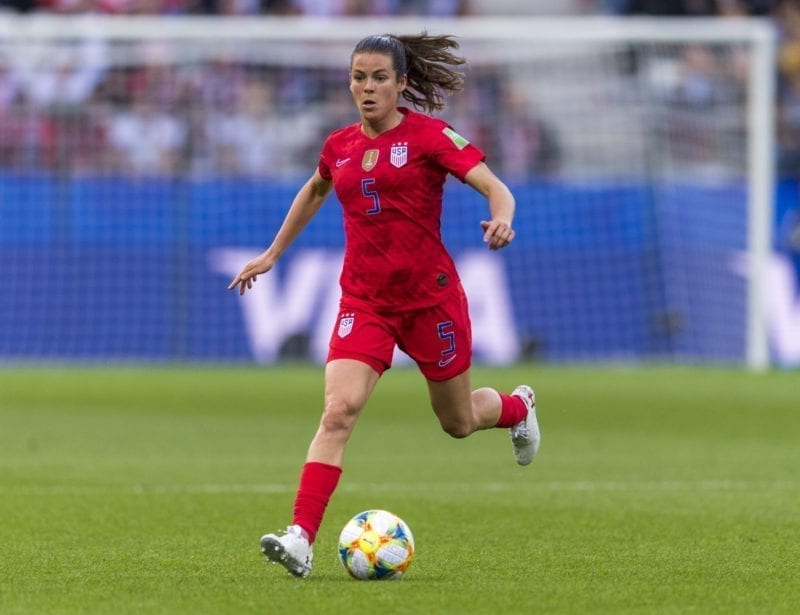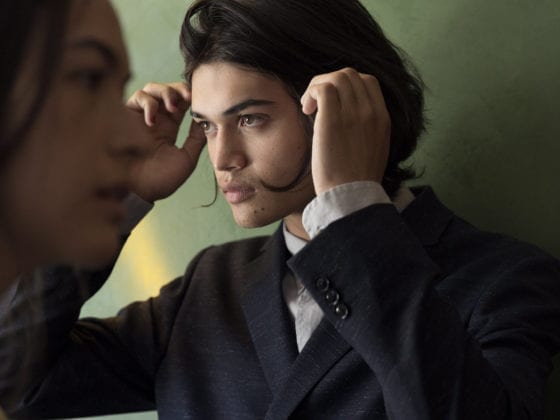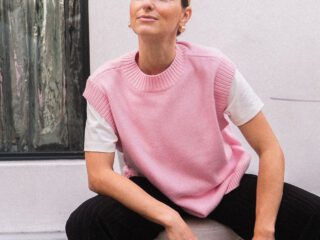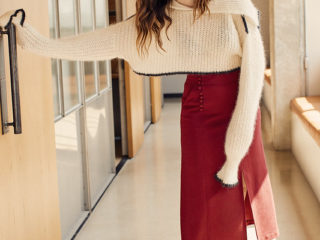“Real Women, Real Work” is a Darling series about everyday women who work in various fields including business, entertainment, science and education. We want to get to know the WHY behind their WHAT and get an inside look into different industries.
You hear about big name sports stars like Serena Williams, Alex Morgan, Naomi Osaka and Simone Biles. What you don’t see is full media coverage of the leagues of powerhouse, female athletes standing beside them. What you don’t hear about are the countless incidences of sexism in the media that female athletes face.
Like when Australian commentator Ian Cohen asked Canadian tennis star Eugenie Bouchard to twirl and show off her outfit. Like when Hungarian swimmer Katinka Hosszú broke a swimming record and won a gold medal but NBC cut to her husband and coach, Shane Tusup. Or when an entire Fox News segment was dedicated to discussing whether female Olympic athletes should wear makeup.
While it’s true that female athletes are much more likely to face sexist microaggressions, according to a study conducted by the University of Minnesota’s Tucker Center, 40 percent of all sports participants are women. Yet, “women’s sports receive only 4 percent of all sport media coverage.” Although two in five girls play sports and 45 percent of participants in the 2016 Olympics were women, media coverage of women’s sports continues to remain inferior to that of their male counterparts.
Haley Rosen, Stanford University alumna and former professional soccer player, has set out to change the standard of women’s sports media coverage. With the vision of a media company focused exclusively on women’s sports, in 2019, Rosen launched Just Women’s Sports. The sports platform does what other media seem to be missing—showcasing women in sports for the athletes they are. With a mixture of highlights, news, analysis, interviews, players features, long-form content, social media, a newsletter and a podcast launching today, JWS is here to show the world that women’s sports are for all audiences.
We got to chat with Rosen, as well as Athlete Partner and JWS podcast host, Kelley O’Hara. O’Hara is a decorated soccer player with two World Cups and an Olympic gold medal, as well as the VP of Brand Engagement & Product Strategy at Tame the Beast. She shared about the impact that the U.S. Women’s National Team’s soccer has had on pushing the envelope for female athletes in the media. In addition, Rosen and O’Hara gave us an inside look of JWS and why women’s sports media coverage is so important. Here’s what they had to say.
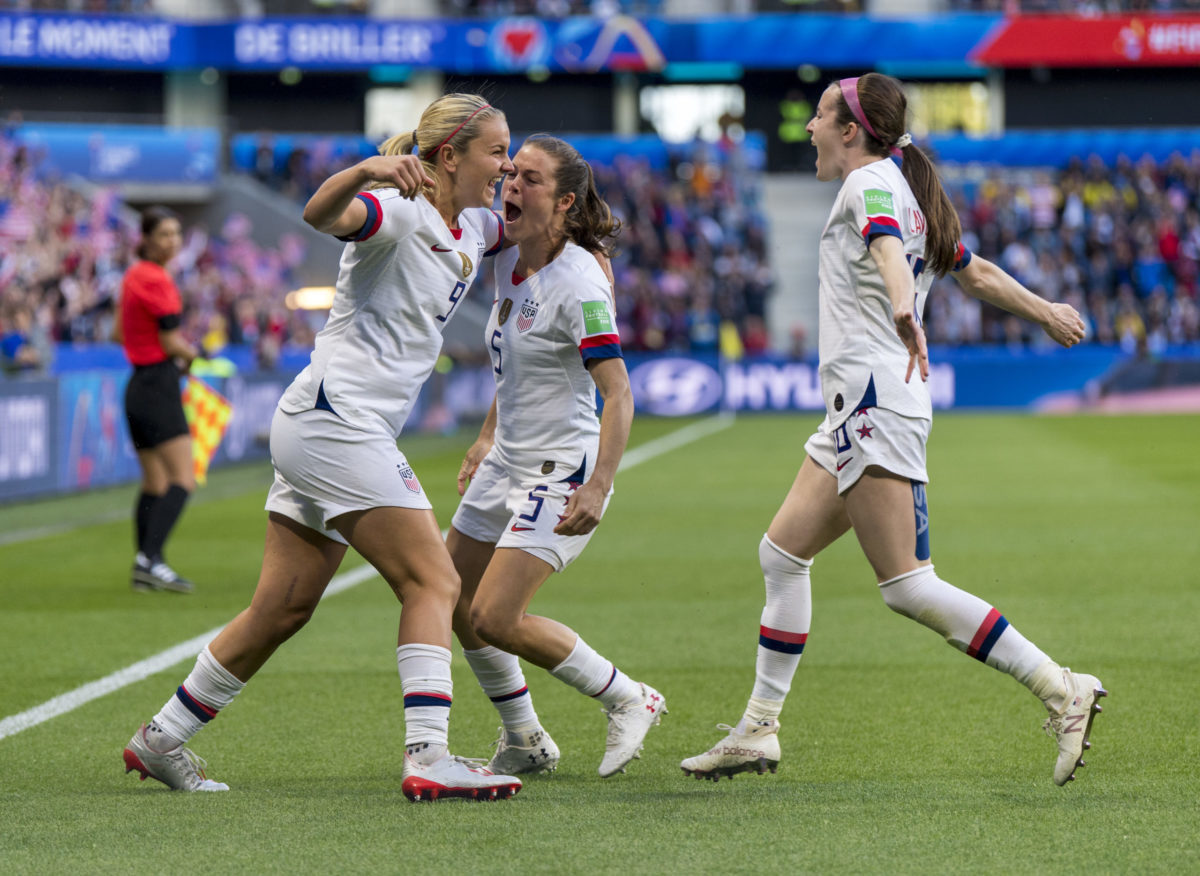
What did you want to be when you were younger? Did you imagine your career would be what it is today?
Kelley: As a little kid, I never thought I’d be a professional soccer player. I just loved to be outdoors and be active. I started playing soccer when I was 4. My parents put me in organized sports as a way to “go burn off energy.” I played a ton of sports growing up, but it was not until high school that I realized soccer was what I really wanted to do. My goal from that point on has always been to just go as far as possible. I don’t think my 14-year-old self would believe me if I told her just how far I’ve gone.
Haley: Growing up, I wanted to be a professional soccer player. Mia Hamm was my idol. I had posters of her on my wall. I had her book, and I even had her Barbie doll. Injuries kind of derailed my career in college, but I was still able to play a few seasons professionally both in the U.S. and abroad.
I’ve always been frustrated with how hard it is to follow my favorite athletes. So although I never imagined I’d end up in media, I think my younger self would be happy to learn that I’m trying to solve that problem.
Kelley, what does it mean to you personally to be a part of the 2019 World Cup winning USWNT team?
Kelley: It’s an incredible honor. For every soccer player, being a World Cup Champion is the pinnacle. That’s the top of the sport. To be able to wear that USWNT jersey and win championships for this team and this country—I feel very lucky to be able to do what I do.
What do you think the USWNT’s public push for equal pay has meant for other female athletes and women?
Kelley: I have had other women, athletes and non-athletes, reach out to say thank you and to tell me just how important and necessary this is. That means a lot. All of us on the national team know we are in a position to create meaningful conversations around gender equality. We have a platform, and we’re willing to use it.
Would we be able to do this if we were not the No. 1 team in the world? Maybe not. But that just makes us realize how important it is that we compete to be the best. We want to push the game forward and fight for what we deserve—what every female deserves—because we know we’re not only fighting for this sport. We’re fighting for what we want the world to look like.
We are fighting for what we want the world to look like.
The National Women’s Soccer League and the USWNT pushed boundaries for equal pay and fair media coverage for female athletes. How did this influence your decision to be a part of Just Women’s Sports?
Kelley: In the beginning, I was introduced to Haley through a club teammate. She had founded this brand and built it from the ground up, knowing that media coverage of women’s sports could be so much bigger and better than it was.
My joining was kind of serendipitous. Originally, Haley wanted me to be a part of the advisory board. We started talking about her plans for JWS, and Haley brought up the podcast. I mentioned that I’d always thought hosting a podcast would be fun. She was immediately stoked on the idea that I could host one for Just Women’s Sports. I told her I had to think about it because I knew that this would be taking me out of my comfort zone and that it would be a big commitment. Over the course of a couple months, we got to a place where it just felt right. We were ready to get started, and I was ready to give it a go!
The biggest reason I ultimately decided to do it was because I know how important visibility is for women’s sports. We need to be able to see female athletes, hear them and learn about them. They need to receive the same exposure as men for there to be growth. I saw this as an opportunity to take matters into my own hands and make women’s sports coverage look like what I knew it could be.
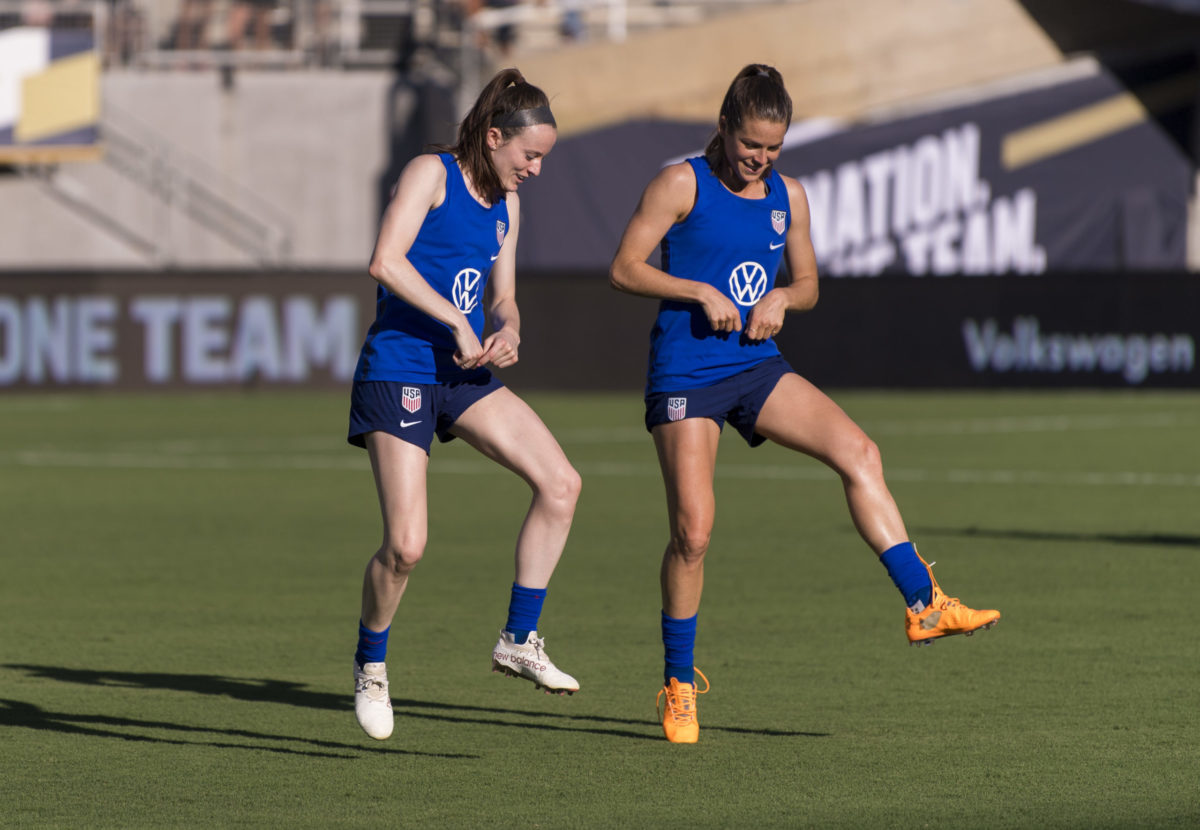
We need to be able to see female athletes, hear them and learn about them.
Haley: Just Women’s Sports exists because only 4 percent of sports coverage is dedicated to women’s sports. To us, that just doesn’t make sense. Everywhere you look, whether it’s the World Cup or the WNBA, women’s sports are exploding. There’s no way to authentically cover the space with that amount of coverage. The fact that traditional media outlets aren’t paying attention is frustrating, but it’s also an opportunity.
From the beginning, we’ve prioritized aligning ourselves with the athletes in the space. Their opinions matter most because they live and breathe this world. That’s a big reason why I jumped at the opportunity to work with Kelley. We’re so excited to have her on board and to be able to create these conversations between athletes that we, as fans of women’s sports, haven’t been able to find anywhere else.
What makes Just Women’s Sports unique and necessary in today’s social climate?
Kelley: It is the opportunity to build the type media coverage that we want around women’s sports. There hasn’t been a media company where I look at it and think, “Yup, they are getting it right.” This is our opportunity to create a platform that actually represents us and tells our stories. These stories are stories that can inspire and empower millions of people.
When I first started playing professionally, I remember basically being told things just were the way they were, and you just had to accept it. What the USWNT is doing with the equal pay lawsuit is proving that athletes have the power to change things. For a long time, I think players have been waiting for media outlets to up their coverage. Now, we’re realizing we have the power to change it ourselves.
Haley: Across the world of women’s sports, attendance is up, viewership is up and sponsorships are up. Almost half of all athletes today are women, but who’s telling their stories? We’ve been told for so long that women’s sports is too niche to find a mainstream audience, but that just isn’t true. The fact is traditional outlets haven’t kept up, and they’re depriving people of half of all sports stories.
In today’s social climate, it’s more obvious than ever that role models are needed and that representation matters. That’s why it’s so important that we align with athletes and work with them to tell their stories.
Almost half of all athletes today are women, but who’s telling their stories?
What has it been like being a part of launching a new business venture in the midst of COVID-19? What have you learned from the experience?
Haley: Something we always say is that sports are culture, and you’ve seen that during the pandemic. The cancellation of sports is what made people take coronavirus seriously in the first place. Even with sports on pause right now, professional athletes are still compelling figures with interesting stories. They’re still engaging fans online and driving important social conversations.
We, ourselves, have seen tremendous growth during this time because we’ve been highlighting individual athletes. Sports media is like a treadmill going a million miles an hour. It doesn’t stop, even when sports do. That has allowed us to continue to build even as we wait for events to return.
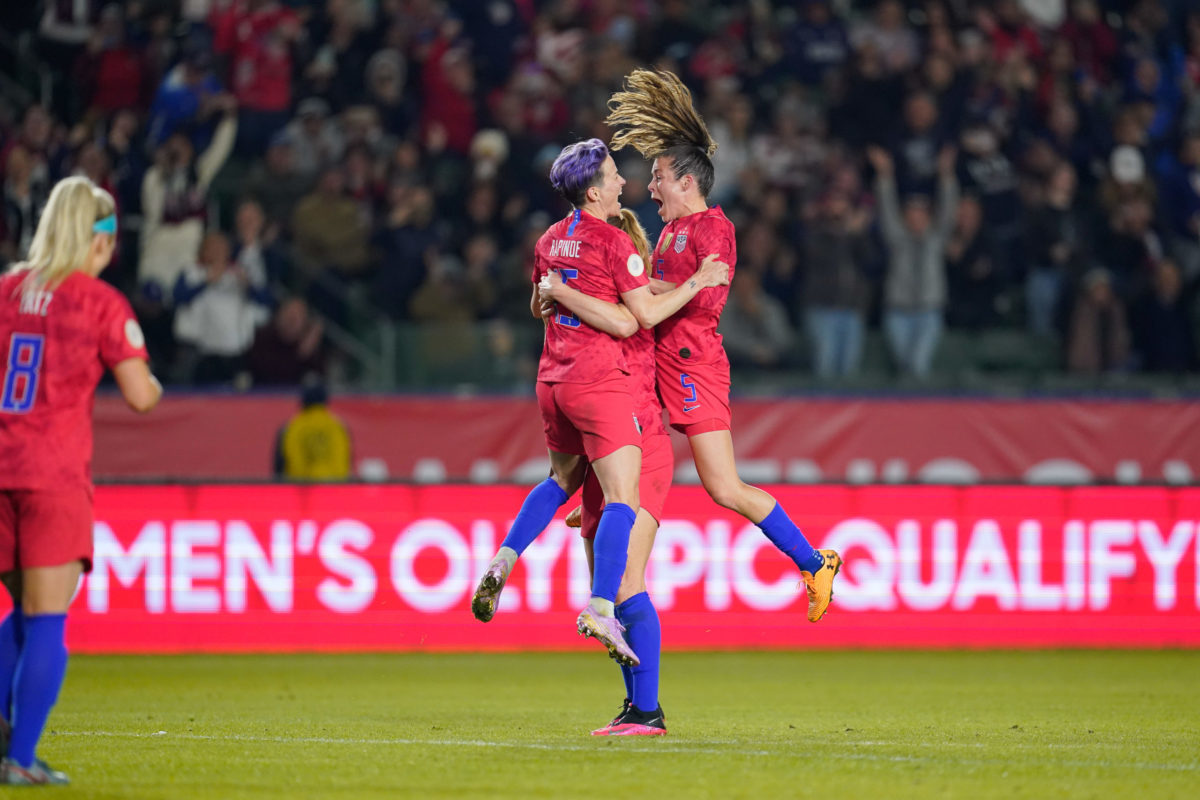
What can people look forward to from Just Women’s Sports?
Kelley: I love hearing people’s stories, and I’m excited to be in a position to facilitate these conversations. I want to cut through the cliches and have real conversations with these women about what it’s like to be a professional athlete at the top of your game.
We’re going to talk about all the victories and the struggles and the twists and turns that are a part of any athlete’s career, but there will be lighthearted moments as well. Athletes are funnier than you think.
Haley: For our podcast, we are interviewing some of the biggest athletes in the world, women like Breanna Stewart and Alex Morgan, who have won everything there is to win. We are moving aside and letting these athletes be themselves by creating a space where they can have candid conversations about their lives and their careers.
Kelley, you are also the VP of Brand Engagement & Product Strategy at Tame the Beast. What’s your favorite part of the role?
Kelley: My favorite part of the role has been being able to influence and help make decisions that are aligned with what I think all brands should be doing, which is making eco-friendly decisions with a focus on sustainability. At Beast, we are revolutionizing the shower game by creating high quality, all-natural ingredients and delivering them in a sustainable way with our Beast Bottle and refill pouches. We also just partnered with One Percent For the Planet, which is a way for us to double down on our commitment to take care of the biggest beast of them all—planet earth.
For the girl or young woman with dreams of succeeding in sports or business, what advice would you give her?
Kelley: The biggest thing to know in terms of sports is that there’s no shortcuts to success. You have to internalize that and realize that it’s all about how bad you want it. In terms of business, I’d just say that whatever you choose to pursue, just go for it. Don’t regret not giving it your all.
Haley: My biggest advice would be, whatever you want, get after it. Don’t wait for permission or expect someone else to do what you want to see done for you. When I first got out of college, I was waiting for things to come to me, but that’s just not how it works.
I realized that if you want to see change, you have to be the person to do it. With Just Women’s Sports, we just went for it. There’s been ups and downs, but we’ve made a ton of progress. You have to create the future you want to see, and you do that by attacking every opportunity.
I realized that if you want to see change, you have to be the person to do it.
What advice would you give to your younger self?
Kelley: Trust your gut. You can’t go wrong. You have intuition for a reason, so lean into it.
I’d also say that you are not defined by your failures. You are defined by how you react to your failures. So many people are scared to fail, but if you are really doing the work—making and chasing lofty goals—shortcomings are inevitable, trust me. It’s what you do after those things that make you into who you are.
Haley: Don’t be so hard on yourself. Play the game and make mistakes. Kelley will appreciate this—whenever we did shooting drills at Stanford, our coach (Paul Ratcliffe) always said, “Remember the good ones. Remember the ones that go in.” I feel like that’s pretty solid life advice. Remember the ones that go in.
Kelley: A good ‘ol Paul quote!
To follow along with Just Women’s Sports, follow them on Instagram, Twitter and Facebook. Be sure to sign up for the JWS newsletter to learn more about your favorite athletes!
Images via Brad Smith / ISI Photos

